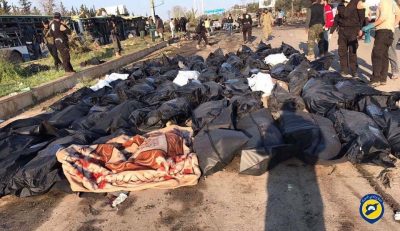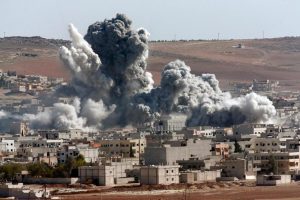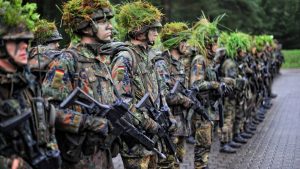Preventing the Escalation of the Syria Conflict. Constitutional Complaint Filed against Germany’s Bundestag

At Saturday, the 17.06.2017, a new group of plaintiffs, consisting of the human rights activist (according to UN resolution 53/144) Sarah Luzia Hassel-Reusing, Gabriela Schimmer-Göresz, and Wolfgang Effenberger, has filed a constitutional complaint against the resolution by the Bundestag (lower house of the German national parliament) of the 09.11.2016 (file number 18/9960) on the prolongation and extension of the Syria deployment of the Bundeswehr (German army). The Federal Government, the fractions of the Bundestag, and the Constitutional Court have already been informed at the 07.04.2017 regarding this constitutional complaint.
The complaint wants to prevent the escalation of the Syria conflict to thermonuclear war and to reach the prohibition of the circumvention, by means of “humanitarian interventions”, of the prohibition of aggressive war.
In addition to that, it wants to put through, that two biased judges move aside to achieve an orderly procedure.
The escalation to thermonuclear war is currently impending particularly by the one-sided illegal no-fly zones / safety zone, which the USA are trying to establish starting from the Syrian-Jordanian border town Al-Tanf. For that purpose, the international alliance in the fight against Isis has, in May and in June 2017, already made two airstrikes against the Syrian army and its Shiite allies, which are progressing towards Al-Tanf. The ad hoc alliance international alliance in the fight against Isis has been created for the fight against Isis, not to attack the Syrian army. And now the Bundeswehr even shall be relocated from the Turkish Incirlik to Jordan. So the direct involvement of the Bundeswehr with ground forces, with reconnaissance for airstrikes of the international alliance in the fight against Isis, and by means of joint staffs, into the escalation at Al-Tanf is impending.
Particularly, as the Iranian news agency Farsnews is worrying, if it comes to a bigger invasion by USA, Great Britain, and Jordan at Al-Tanf. The current American behaviour gives the impression not to have been discussed with His Excellency, US President Donald Trump – similarly to the attempt by general John Allen (CNAS and then coordinator of the international alliance in the fight against Isis) in July 2015 for a no-fly zone in the North of Syria.
The papers by the think tanks CNAS (“Defeating the Islamic State – A Bottom-Up Approach”) and Brookings Institution (“Deconstructing Syria – Towards a regionalized strategy for a confederal country”) and the article “The Right Way to Create Safe Zones in Syria” of the 11.05.2017 in Foreign Affairs (the magazine of the think tank CFR) are advertising (whilst downplaying the escalations risks) for no-fly zones / safety zones directed to escalation. Also the deescalation zones settled by Russia, Iran, and Turkey mean an escalation risk, because it is unclear, in how far the other countries involved in the Syria conflict will respect them.
The enforcement of any of these zones means in last consequence the downing of those fighter jets, which disrespect them, up to the danger of direct escalation with Russia respectively with the USA. Already in October 2016, there have been deliberations in the National Security Council of the USA, to abuse the international alliance in the fight against Isis for attacks against the Syrian army. Also the threat by Russia in October 2016, to down planes which are threatening the Russian troops in Syria, show the escalation risk.
Isis and Al Qaida, which have received their Armageddon ideology from the Muslim Brotherhood, are striving for the escalation of the Syria conflict to world war, because they regard themselves as chosen to provoke the final battle described in the Islamic Revelation, in order to bring about this way until 2020 the global caliphate, which also the Muslim Brotherhood is striving for. And it is completely obscure, which State and / or private actors really command Isis and Al Qaida. In addition to that, there are significant publicly visible pieces of evidence signalling, that the extortion networks (organized via human trafficking) of the international “deep state”, with its branches into secret services, into organized crime, into jihadism, into banks, and into armageddon-believing and occult groups, are able, to pressure also Western security policy deciders into the escalation of this conflict. Furthermore, the escalation of the Syria conflict is impending by attempts to split the country, and by the lacking coordination of the countries, which are militarily involved in Syria, with each other and particularly with the Syrian government. The nuclear powers USA, Russia, Great Britain, France, Israel, Saudi-Arabia, and China, are involved in the conflict, with different interests and to different extents. Also the joining of NATO into the international alliance in the fight against Isis has increased the escalation risks. Escalations risks originating from Germany, are also deployment of German soldiers in the Kurdish areas of Syria (which has been prohibited by the Syrian government) and the two biased constitutional judges.
The constitutional complaint shows these escalation risks for the German Syria deployment.
The Syria conflict has, already several times, nearly escalated, among them the prevention just in time at the 31.08.2013 and the proposal by Saudi-Arabia in February 2016 (rejected by NATO) to invade into Syria and Iraq with an international Sunni ad hoc alliance.
And the repeated airstrikes by the international alliance in the fight against Isis against Syrian troops and Shiite troops allied with them, which are progressing towards Al-Tanf, seem to be short before escalation.
The deployment violates objectively the prohibitions of aggressive war and disturbs the peaceful coexistence of the peoples (art. 26 Basic Law, art. 2 par. 4 UN Charter). See also the definition of “aggression” in the resolution by the UN General Assembly of the 14.12.1974. In June 2016, the protest by the Syrian government has proven, that it rejects also the German deployment, which has neither been requested by it nor been coordinated with it. The parliamentary reservation (art. 115a Basic Law) is violated, because the consent of the Bundestag also had to be requested for before the case of mutual defence resolution at the EU level of the 16./17. 11.2015 (file number 14120/15).
The EU clause on mutual defence (art. 42 par. 7 TEU) is still invalid, because, as the Lisbon Judgment of the 30.06.2009 has decided, the EU would have to decide before, that it wants a common defence policy, which then would have needed the consent by all national parliaments of the EU member states (art. 42 par. 2 subpar. 1 TEU); at least the latter has never taken place. In addition to that, the EU is, without a valid clause on mutual defence, (in contrast to NATO) no system of mutual collective security; the Bundeswehr may be used for combat deployments only for the defence of the own country and within system of mutual collective security (art. 24 par. 2 Basic Law). And the international alliance in the fight against Isis is an ad hoc alliance without any ratified treaty and so obviously without any clause on mutual defence. Also the Syria resolutions by the UN Security Council do not legalize the deployment, since they just do NOT state according to art. 42 UN Charter, that peaceful means were unsuccessful or without any chance, and so they do NOT authorize military means, since they in the contrary set on negotiations and on ever harder sanctions against Isis, against Al Qaida, and against ever more groups of their supporters.
The terrorist attacks at Paris of the 13.11.2015 have remained below the treshold of a militarily armed attack. The resolution on the case of mutual defence has only disattracted the attention from the fact, that the Syria deployment is a military intervention for values and interests (art. 42 par. 5 TEU) and for crisis intervention (art. 43 par. 1 TEU) – according to the ideology of the “humanitarian intervention”. That ideology has developed from the study “Self Determination in the New World Order” of the year 1992 by the think tank Carnegie Endowment for International Peace, and it provenly aims at making circumventable the prohibition of aggressive war (art. 2 par. 4 UN Charter) and the responsibilities of the UN Security Council. It abuses the human rights against peace and so violates art. 29 no. 3 of the Universal Declaration of Human Rights. The ideology of the “humanitarian intervention” has been, in the latest 24 years, responsible for “regime changes” called “colour revolutions” and for wars (with the Kosovo war as the first bigger experiment) including the nearly escalation of the Syria conflict to thermonuclear war, which has been narrowly prevented at the 31.08.2013. And the escalation attempts are still going on, as the current aggravating situation at Al-Tanf shows.
The resolution by the Bundestag of the 09.11.2016 and the resolution by Their Excellencies, the Defence Ministers of the EU member states, of the 16./17.11.2015, have disregarded the provisions of the Lisbon Judgment for the interpretation of the Common Foreign and Safety Policy (CFSP) of the EU into conformity with the UN Charter. Thus the constitutional complaint applies, in order to reach legal safety for the peace order of the United Nations and for the existence of the European Union, to oblige the Federal Government to apply in the UN General Assembly for an advisory opinion of the International Court of Justice (ICJ) on the following question:
“How exactly has the interpretation of the norms of the Treaty on the European Union (TEU) on military interventions for values and interests (art. 42 par. 5 TEU), on military interventions for interference into crises (art. 43 par. 1 TEU), and the EU clause on mutual assistance (art. 42 par. 7 TEU), which is still not ratified according to art. 42 par. 2 subpar. 1 TEU, each to be limited into conformity with the UN Charter and with the Universal Declaration of Human Rights (UDHR), in order to completely exclude any possibility to violate art. 2 par. 4 UN Charter, art. 103 UN Charter, or art. 29 no. 3 UDHR, by means of these norms, and in order to, at the same time, exclude the risk of voidness of the TEU according to art. 53 Vienna Convention on the Law of Treaties because of incompatibility with the UN Charter and with the UDHR, which belong to the ‘jus cogens’ ?”
The constitutional complaint applies to prohibit the Syria deployment of the Bundeswehr, because it violates the human dignity in connection with the peace principle (art. 1 par. 1+2 Basic Law) and the basic right to vote (art. 38 Basic Law) (because of the missing legal bases for large parts of the deployment). The peace principle (art. 1 par. 2 Basic Law), which is formulated as a confession of the German people, is entrenched in the human dignity (art. 1 par. 1 Basic Law) and has been included into the Basic Law inspired by the famous “speech of hope” of His Excellency, the then US Foreign Minister James F. Byrnes. In order to ensure, that there will be never again world war, and that Germany never again contributed to the increase of world war risks, all Germans have been, by means of the confession in art. 1 par. 2 Basic Law, obliged and entitled to peace by the Parliamentarian Council, which has concluded the Basic Law. The existence of the peace principle has been confirmed by the Lisbon Judgment of the 30.06.2009 of the Constitutional Court.
The constitutional complaint applies, in view of the undemocratically big influence of the think tank SWP and, besides that, of the Bilderberg conference, on the German position on Syria, to exclude think tanks from international conferences with German participation on foreign and safety policy, and to allow the counselling to German institutions regarding foreign and safety policy only to those think tanks, whose recommendations do neither violate the Basic Law nor the UN Charter, with particular attention to the prohibitions of aggressive war and its preparation (art. 26 Basic Law, art. 2 par. 4 UN Charter) and to the inviolable peace principle (art. 1 par. 2 Basic Law), and which do not at the same time counsel other countries.
The constitutional complaint applies, that the Constitutional Court has to make provisions, as far as foreign and safety policy are concerned, for the application of the conscience of the members of the parliament, which is included in the basic right to vote (art. 38 par. 1 s. 2 Basic Law). Also before the resolution of the 09.11.2016 (file number 18/9960), the legal bases and the world war risks of the Syria conflict have still not been carefully investigated by the members of the parliament.
The constitutional complaint explains legal question furthering the constitutional jurisdiction, showing that the hitherto interpretation by the Constitutional Court of the norms on bias (art. 18 and 19 of the law on the Constitutional Court) is intenable and is an open door for lobbyists even up to possible endangering of the Basic Law, because it, in contrast to the wording of the law, defines bias much narrower, and it allows, in contrast to the wording of the law, judges to participate in decisions on rejections directed against themselves.
The complaint invokes the violation of the human dignity (art. 1 par. 1 Basic Law) in connection with the peace principle (art. 1 par. 2 Basic Law), of the basic right to vote (art. 38 Basic Law), of the basic rights to life, to physical integrity, and to freedom (art. 2 Basic Law), and of the basic right to function reservation (art. 33 par. 4 Basic Law), as well as the violation of the universal human rights to security (art. 9 ICCPR), to health (art. 12 CESCR), and to prohibition of war propaganda (art. 20 ICCPR).
The constitutional plaintiffs and their representative applied for in the constitutional complaint according to art. 22 par. 1 s. 4 BVerfGG, are available for interviews to domestic and foreign, conventional and alternative, media.
Featured image: White Helmets



